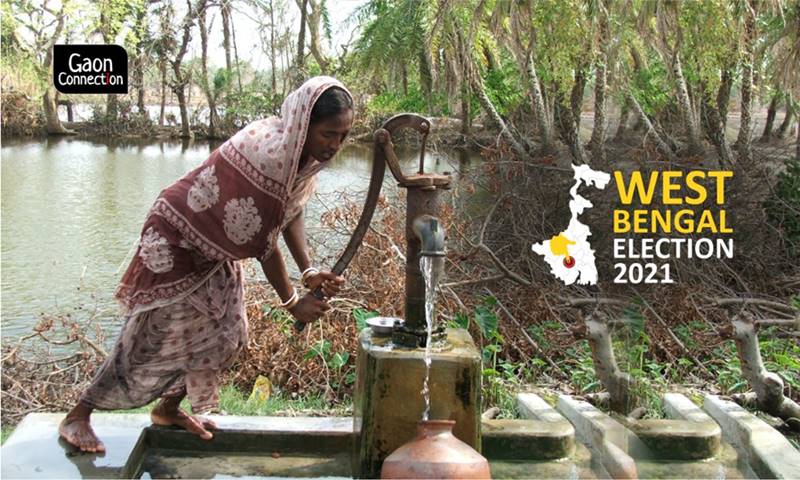Every morning, Subroto Chakrobarty of Deulpur village is in a tearing hurry. At 6 am, he must leave his house and rush to the village tubewell carrying empty buckets and pots. Any later than that and his family may not have water to drink till 1 pm when his wife marches to the village tubewell to fetch water.
“Every day, we have to fetch water from the tubewell. We do not have tap water at our home,” Chakrobarty, who hails from Deulpur village of Howrah district, 20 kilometres from the state capital Kolkata, West Bengal, told Gaon Connection.
“Over twenty thousand people live in our village. Not even a single household in the village has tap water connection here. Everyone has to fetch water from the tubewell,” he said.
The daily grind of Chakrobarty and his fellow villagers is shared by a large chunk of rural population in West Bengal, which is going to polls from March 27 to April 29. Deulpur village goes to the polls on April 10.
Of the total 16.3 million rural households in the state, only 6.74 per cent have tap water connection (as of February 15, 2021), the lowest in the country. This data was shared recently by the Department of Drinking Water and Sanitation, under the Ministry of Jal Shakti. It is part of the Standing Committee on Water Resources’ eleventh report presented to the Lok Sabha on March 8.
Situation is no better in the northeastern state of Assam, which is going to polls from March 27 to April 6. At 6.83 per cent, Assam has the second lowest tap water coverage of rural households.
The other worst performing states and union territories are Ladakh (7.57 per cent), Uttar Pradesh (9.49 per cent), and Meghalaya (10.66 per cent).
There are only two states that have achieved 100 per cent coverage of tap water connections to rural households. These include Goa and Telangana.
Meanwhile, Andaman & Nicobar Islands, Puducherry, Haryana, Gujarat, and Himachal Pradesh, have recorded 90.01 per cent, 88.24 per cent, 85.84 per cent, 82.3 per cent, and 75.77 per cent of tap water coverage, respectively.
In 2019, the central government launched its flagship scheme — Jal Jeevan Mission — to provide functional household tap connection (FHTC) to every rural household, including schools, and anganwadis. It aims at providing safe and adequate tap water to all households in rural India by 2024.
“It is the election season and the candidates have come around this time too promising us tap water. But what has not happened for so many years now, is unlikely to happen now,” rued 50-year-old Chakrobarty.
Water contamination
As of February 15 this year, 48,969 rural habitations spread over 251 districts in 20 states/UTs are affected with water quality issues and contamination.
The state/UT-wise details of habitations affected with the various contaminants shows that of the total 23 districts in West Bengal, 19 have reported water contamination. As many as 1,108 habitations are affected by arsenic in the state. At 1,247, Assam reported the highest number of habitations affected by arsenic.
Prolonged ingestion of arsenic-containing drinking water is associated with an increased risk of bladder cancer and skin cancer, and medical exposure to arsenic has been clearly associated with skin cancer in epidemiological studies.
Tap water coverage in anganwadis
Three states — West Bengal, Assam, and Uttar Pradesh — have recorded lowest tap water connection coverage to both households and anganwadi centres.
As per the recent Standing Committee report, percentage coverage of anganwadis with tap water supply shows that Assam has the lowest tap water coverage of 2.22 per cent only. This is followed by Jharkhand (2.52 per cent), Uttar Pradesh (5.08 per cent), Chhattisgarh (5.40 per cent), West Bengal (5.80 per cent), and Odisha (11.08 per cent).
“Unsafe water puts children coming to anganwadis at a high risk of diseases, such as diarrhoea. There are many areas in the country where you would find fluoride in water. Consuming such water leads to fluorosis disease,” Rakesh Malviya, member, Vikas Samwad Samiti, a non-profit based in Bhopal, Madhya Pradesh, told Gaon Connection.



















